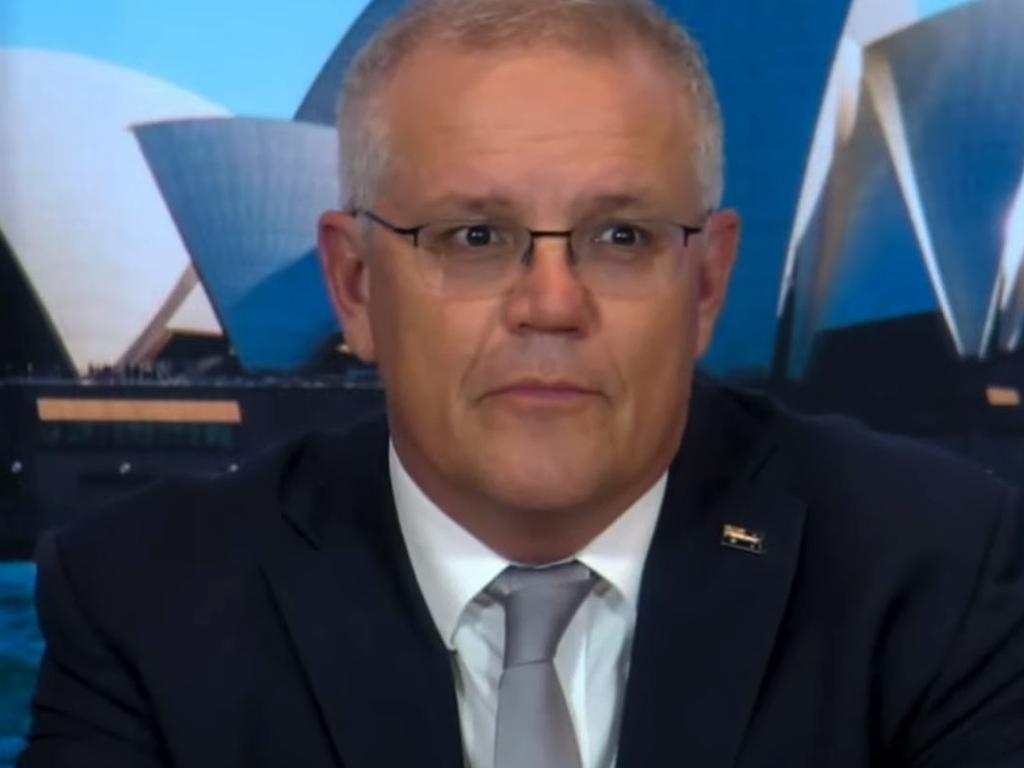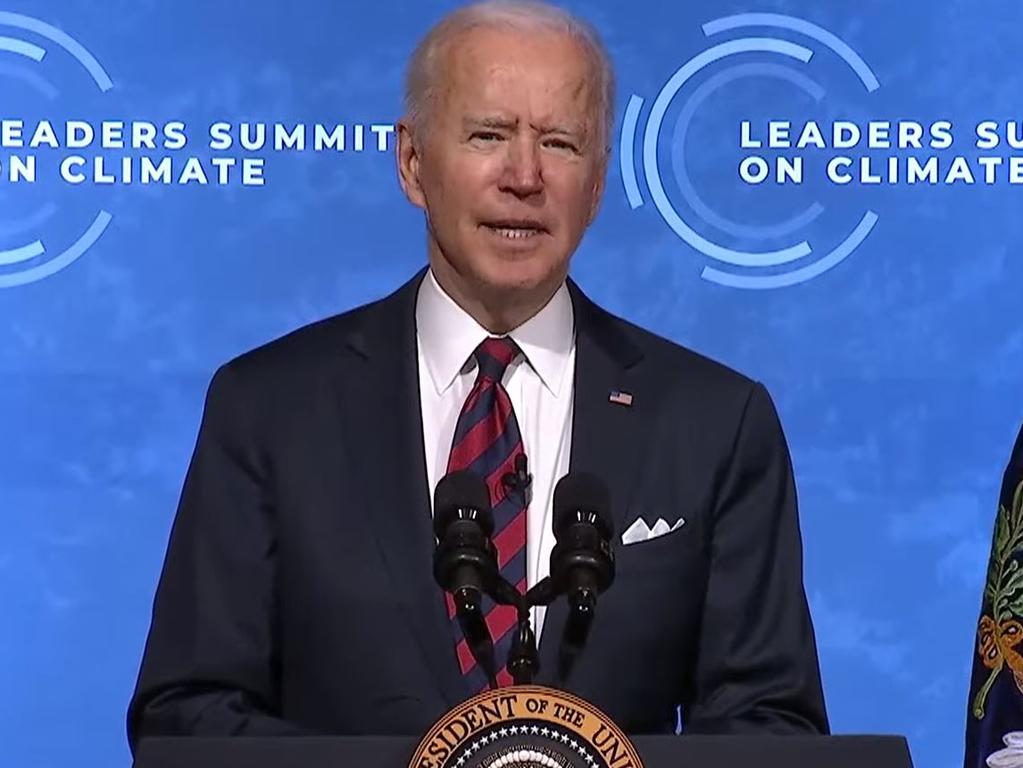Climate summit: Scott Morrison’s awkward moment as he addresses world leaders
Prime Minister Scott Morrison suffered an embarrassing technical hitch as he addressed global leaders at a White House climate summit.
“You’re on mute,” has become a familiar phrase during the pandemic. And Prime Minister Scott Morrison became the latest victim of the curse as he suffered a deeply awkward moment while addressing global leaders at a major White House climate summit.
As Mr Morrison began speaking about Australia’s climate targets and achievements via video link, he seemed unaware those watching from around the world could not hear any sound.
“Mr. Prime Minister, I’m not sure we’re hearing you here,” said US Secretary of State Antony Blinken, in an embarrassing moment for the PM.
The sound finally kicked in almost a minute into Mr Morrison’s short speech, with his opening statements missed by most viewers.
“We are well on the way to meeting and beating our Paris commitments,” said Mr Morrison.
“Already we have reduced our emissions by 19 per cent on 2005 levels, more than most other similar economies, and by 36 per cent when you exclude exports.”
RELATED: What is net zero emissions, and how do we get there?

RELATED: One thing Australia won’t do to cut emissions
He said Australia was deploying renewable energy “10 times faster than the global average per person” and was “on the pathway to net zero”.
But he avoided setting new targets as some at the summit did, saying Australia was investing in “new technology solutions” including $20 billion to bring down the cost of clean hydrogen and carbon capture.
“Mr President, in the United States, you have the Silicon Valley,” he said. “Here in Australia, we are creating our own hydrogen balance, where we will transform our transport industries and mining and resource centres, and manufacturing our fuel and energy production.”
He said the “journey to net zero” was being led by “world class pioneering Australian companies” like Fortescue, BHP, Rio Tinto and AGL, as well as agricultural and marine sectors through soil science and protected fisheries.
“Marine protected areas in Australia are approaching 40 per cent of our waters,” he added, noting that Australia had funded “over 100 cutting edge projects to safeguard our global treasure, the Great Barrier Reef” and was committing a further $100 million to protect oceans, coastal ecosystems and “blue carbon initiatives” to mitigate climate change.
Mr Morrison has faced criticism for not setting a timeframe for reaching net zero, but he told a press conference earlier on Thursday that “later in the year we’ll address those” saying it “was not our plan to do that this evening.”
Australia aims to reduce greenhouse gas emissions to 26–28 per cent below 2005 levels by 2030 and Mr Morrison has said a goal is to achieve net zero emissions “preferably by 2050”.
It’s a divisive issue within the Coalition with some MPs fearing it will be a jobs killer in communities dependent on mining or electricity generation.
The PM’s big claims were among many boasts as world leaders exchanged claims their countries were performing better than others and some made tangible new commitments on climate.
Xi Jinping says China will strive to cut carbon dioxide emissions before 2030 and achieve carbon neutrality before 2060.
— Sky News (@SkyNews) April 22, 2021
The president says China will be able to achieve carbon neutrality "in a much shorter time span" than other developed countries.https://t.co/rcgTysPTk8pic.twitter.com/TLvpfsgjRd
China’s President Xi Jinping claimed the country will achieve carbon neutrality “in a much shorter time span” than other countries, in his speech to the global climate summit attended by 40 world leaders.
Mr Xi cited “extraordinarily hard efforts” as he said China would cut carbon emissions before 2030 and achieve carbon neutrality before 2060, in one of many vaunting speeches at the summit hosted from the White House.
In his virtual address, the Chinese president called on the world’s biggest economies to do more, saying they should “increase climate ambition and action and make concrete efforts to help developing countries accelerate the transition to green and low carbon development”.
His comments came after US President Joe Biden committed to halving emissions by 2030 at the opening of the summit attended by leaders including Canadian Prime Minister Justin Trudeau, UK PM Boris Johnson and France’s Emmanuel Macron.

RELATED: The three words embarrassing Australia
Mr Biden is more than doubling the previous target as he commits to slashing emissions to 50-52 per cent compared with 2005 levels.
“The science is undeniable,” he said. “The cost of inaction just keeps mounting ... All of us, and particularly those of us who represent the world’s largest economies, we have to step up.
“Those that do take action and make bold investments in their people, and the clean energy future, will win the good jobs of tomorrow, and make their economies more resilient, more competitive.
“Scientists tell us this is the decisive decade. This is the decade we must make decisions that will avoid the worst consequences of the climate crisis.”
He warned that no nation can solve this crisis “on its own” and called for countries to work together.
“If we do, we will breathe easier, literally and figuratively,” he said. “This is a moral imperative and an economic imperative ... but also a moment of extraordinary possibilities.”
There will be scepticism about America’s ability to meet the ambitious target, however, with climate activist Greta Thunberg calling out the “bulls***” of world leaders ahead of the Earth Day summit.
âš ï¸This is an emergency alert for the general publicâš ï¸#MindTheGap#LeadersClimateSummit#EarthDay#NoMoreEmptySummitspic.twitter.com/e1z1A783I2
— Greta Thunberg (@GretaThunberg) April 22, 2021
In a video she captioned on social media as “an emergency alert for the general public”, the young Swede accused leaders of presenting “very insufficient targets” and said “we cannot be satisfied with something just because it is better than nothing”.
She said she would not give up “in a million years” and that “every fraction of a degree” matters in trying to prevent temperatures rising above seriously dangerous levels.
Greta said the “bulls***” of world leaders on this issue was the biggest elephant there has ever been in any room.
Russian President Vladimir Putin also raised eyebrows as he claimed Russia had reduced greenhouse gas emissions “a greater extent than other countries”, saying it was making an “active effort” to build more legislation around climate issues.
He said that 45 per cent of energy in the country comes from low emission energy sources, adding that he was “genuinely interested” in working with other nations to meet climate goals.
India is the world’s largest emitter, but Prime Minister Narendra Modi claimed the nation’s carbon footprint was “60 per cent lower than the global average” thanks to a lifestyle “rooted” in sustainability, calling for the world to get “back to basics”.
"I want to emphasise the importance of lifestyle change in climate action"
— Sky News (@SkyNews) April 22, 2021
Prime Minister Narendra Modi says lifestyle in India is responsible for a 60% lower carbon footprint than the global average, calling on the world to move "back to basics".
Live https://t.co/rcgTysPTk8pic.twitter.com/loaMVSkHUT
King Salman Bin Abdulaziz Al Saud listed initiatives the country has already committed to, saying “these challenges recognise no national borders”, while Argentinian President Alberto Fernandez warned the world was on “a suicidal path” if major action was not taken.
Several leaders made digs at Donald Trump, with European Commission president Ursula Von der Leyen, German Chancellor Angela Merkel and Italian Prime Minister Mario Draghi all welcoming the US back to the table.
New Zealand Prime Minister Jacinda Ardern was thanked for her contribution after she used the summit to call on other nations to follow her country’s lead and do four things: price carbon, make climate related financial disclosures mandatory, end fossil fuel subsidies, and finance adaptation.
UK Prime Minister Boris Johnson described the US move as “game changing” and said
nations needed to be “constantly original and optimistic” in terms of new ideas and tech.
“It is vital for all of us to show that this is not all about some expensive, politically-correct green act of bunny hugging,” he said.
"It's vital for all of us to show that this is not all about some expensive, politically correct green act of bunny hugging... This is about growth and jobs" says Prime Minister Boris Johnson at #EarthDay summit.
— Sky News (@SkyNews) April 22, 2021
Read more analysis here: https://t.co/xJZnKi3Xvipic.twitter.com/z4NdLchGlI
“Let’s use this extraordinary moment and the incredible technology we are working on, to make this decade the moment of decisive change in the fight against climate change - and let’s do it together.”
Mr Trudeau said his country was “on track to blow past our old target” on climate change, saying the nation was ready to “raise our climate ambition” and setting a new target of reducing emissions by 40% to 45% by the end of the decade compared with 2005 levels.
The new targets will bring the world closer to the target of keeping Earth’s temperature less than 1.5 degrees Celsius above pre-industrial times — the level scientists say is needed to avoid the worst effects of climate change.
A US official said the nation’s new US aims to “challenge the world on increasing ambition and combating the climate crisis”.
Mr Biden and Vice President Kamala Harris opened the inaugural session of the summit by underscoring the “urgent need for the world’s major economies to strengthen their climate ambition” by November’s COP26 climate conference to keep the 1.5C goal in reach.
Read related topics:Scott Morrison



